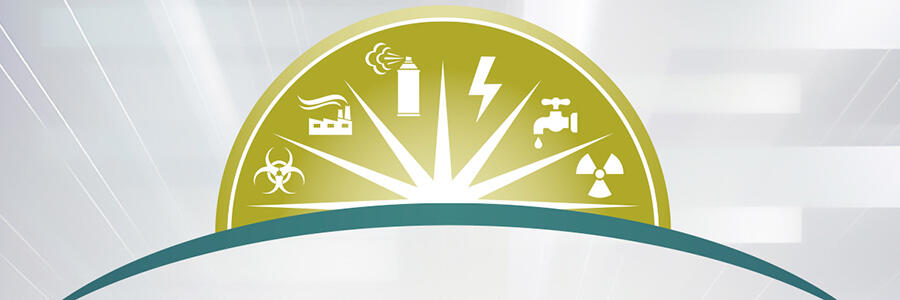Sharing Strategies to Move From Reactive to Proactive Approaches to Identify New Environmental Concerns
Tuesday, April 30, 2024 • 9:00 a.m. – 3:20 p.m. EDT &
Tuesday, May 7, 2024 • 10:00 a.m. – 2:00 p.m. EDT
Purpose
NIEHS convened a two-day virtual workshop on Horizon Scanning to proactively identify and improve responses to emerging contaminants, emergencies, and issues of concern. Horizon scanning activities engage experts in conversations to predict responses or capabilities that may be needed; scoping typically consists of compiling bits of information and working with a stakeholder to satisfy their needs.
NIEHS Workshop Organizing Team
Led by the Emerging Contaminants and Issues of Concern (ECIC) Program Management Team (Division of Translational Toxicology).
- Chad Blystone, Ph.D., NIEHS
- Helen Cunny, Ph.D., NIEHS
- Suzanne Fenton, PhD., NC State University
- Heather Henry, Ph.D., NIEHS
- Ruth Lunn, Dr.P.H, M.S., NIEHS
- Kyle Messier, Ph.D., NIEHS
- Kirsten Overdahl, Ph.D., NIEHS
- Sonika, Patial, D.V.M., Ph.D., NIEHS
- Stephanie Smith-Roe, Ph.D., NIEHS
Workshop Goals
- Advance horizon scanning methods or tools (for the scientific community) and inform a strategy or framework for addressing new environmental concerns.
- Identify contaminants (e.g., chemicals, mixtures) in the environmental and biological samples (e.g., non-target chemical analyses).
- Identify exposure sources and affected communities.
- Identify issues of community concern (e.g., social media and crowd sourcing).
- Provide a forum to share insights, coordination opportunities, and challenges for researchers, federal and state agencies, including research and regulatory agencies), non-government advocacy groups, and affected populations.
Anticipated Outcomes
The workshop was expected to benefit ECIC, NIEHS, and the scientific community at large and include:
- Develop NIEHS (including ECIC) horizon-scanning approaches.
- Establish a network or community of practice for sharing information about horizon scanning.
- Identify key CEC stakeholders and initiate sharing of current methods from participating organizations involved in horizon scanning.
- Whitepaper or journal publications summarizing existing tools, research gaps, guidance, or strategies for proactively identifying emerging contaminants or issues of concern and best practices for communicating hazard information to affected communities.
Agenda
Day one focused on articulating the current scope of our abilities and technologies for horizon scanning; we also identified current gaps or weaknesses in those abilities. At the conclusion of Day one, participants were asked to consider what advancements in our abilities need to occur, and what a collaborate directed effort – a community of practice – may look like.
Day two featured collaborative round-table discussion and workshop time to address these two questions, and to outline key needs and features for a community of practice. This collaborative half-day laid the groundwork for building an inter-agency, interdisciplinary community of practice for horizon scanning.
| Day 1: Tuesday, April 30, 2024 (all times listed are Eastern Daylight Time) | |
|---|---|
| 9:00 a.m. | Welcome and Introductory Ruth Lunn, Dr.P.H., NIEHS |
| 9:10 a.m. | Plenary Session Anticipating Tomorrow's Chemical Challenges: Empowering Policy Through Horizon Scanning Christopher Green, Ph.D. Department for Environment, Food and Rural Affairs UK Government |
| 9:50 a.m. | Session 1: Current Strategies Chad Blystone, Ph.D and Heather Henry, Ph.D., NIEHS |
| 9:55 a.m. | The National Emerging Contaminant Research Initiative: Federal Interagency Strategy and Implementation Plan Benjamin Place, Ph.D. White House Office of Science and Technology Policy |
| 10:20 a.m. | A Good Defense… Accelerating the Identification of Emerging Chemicals of Concern Rebecca Clewell, Ph.D., D.A.B.T. Valerie Adams, Ph.D., D.A.B.T. Department of Defense |
| 10:45 a.m. | Interstate Technology Regulatory Council (ITRC) Contaminants of Emerging Concern Identification Framework Vivek Mathrani, Ph.D., D.A.B.T. Senior Toxicologist, California Department of Toxic Substances Control (DTSC) |
| 11:10 a.m. | Session Discussion Chad Blystone, Ph.D., NIEHS Heather Henry, Ph.D., NIEHS |
| 11:25 a.m. | Break |
| 11:35 a.m. | Session 2: Research Gaps Session Co-Chairs: Kyle Messier, Ph.D., NIEHS Kirsten Overdahl, Ph.D., NIEHS |
| 11:40 a.m. | The Additive Value of Wastewater Surveillance Across Community Space and Time: Past Precedent and Future Opportunities Rochelle Holm, Ph.D. Christina Lee Brown Envirome Institute University of Louisville |
| 12:10 p.m. | U.S. Climate Vulnerability Index: Who Are the Most Climate Vulnerable and Why? Grace Tee Lewis, Ph.D. Environmental Defense Fund |
| 12:35 p.m. | Lunch Break |
| 1:15 p.m. | Laying a Foundation for NTA at EPA: Expanding Adoption, Utility, and Confidence Elin Ulrich, Ph.D. Environmental Protection Agency |
| 1:40 p.m. | Developing Strategies to Confidently Highlight and Identify Compounds of Interest in Complex Matrices Christine Fisher, Ph.D. Food and Drug Administration |
| 2:05 p.m. | Identifying Research Opportunities From Unconventional Sources: Intersections of Fields, Non-Traditional Solvers, and Outsider Ideas Jennifer Couch, Ph.D. National Cancer Institute |
| 2:30 p.m. | Session Discussion Kyle Messier, Ph.D., NIEHS Kirsten Overdahl, Ph.D., NIEHS |
| 2:55 p.m. | Think Tank: Where do we go from here? Kirsten Overdahl, Ph.D., NIEHS |
| 3:30 p.m. | Closing Heather Patisaul, Ph.D. Scientific Director, Division of Translational Toxicology, NIEHS |
| 4:00 p.m. | Adjourn |
| Day 2: Tuesday, May 7, 2024 (all times listed are Eastern Daylight Time) | |
|---|---|
| 10:00 a.m. | Round Table Discussion |
| noon | Break |
| 12:30 p.m. | Round Table Discussion (continued) |
| 2:00 p.m. | Closing |



